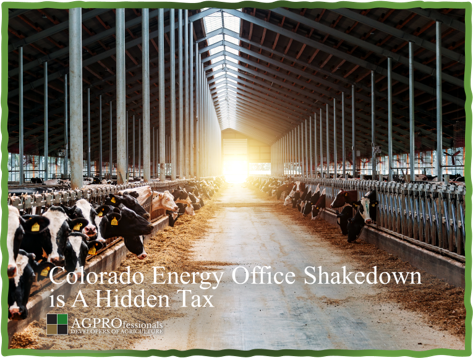The Urban Dictionary defines a “shakedown” as:
“Another word for extortion/blackmail, or the obtaining of a good or service through means of force, threats/intimidation, or abuse of power."
Colorado’s Energy Performance for Buildings Statute
Colorado House Bill 21-1286, the Energy Performance for Buildings Statute, was established with the goal of helping building owners increase energy efficiency, lower energy costs, and decrease greenhouse gas emissions.
This sounds like a great idea until implementation commences, and government agencies enter the picture.
Agriculture is Supposed to Be Exempt
The Colorado Energy Office is mandated to address the “Energy Performance for Buildings” statute. It requires buildings over 50,000 square feet to comply with new energy standards by 2030. According to the law, agricultural buildings are exempt.
It clearly states:
“(II) "COVERED BUILDING" DOES NOT INCLUDE:
(B) A BUILDING IN WHICH MORE THAN HALF OF THE GROSS FLOOR AREA IS USED FOR MANUFACTURING, INDUSTRIAL, OR AGRICULTURAL PURPOSES;
Even though the statute states agricultural buildings are exempt, that sure doesn’t seem to be the case. A free-stall barn certainly is an agricultural building. However, farmers with free-stall barns are receiving notices from the State Energy Board.
Notice verbiage:
“There are two pathways a building owner can comply with Building Performance Colorado;
1. Submit a Benchmarking Report and Pay the Annual Fee:
Please…submit your benchmarking report AND pay the annual fee of $100 per covered building. Once your benchmarking report is approved and your fee is paid, you will be in compliance with Building Performance Colorado
2. Submit a Waiver and Pay the Annual Fee:
Submit a waiver request AND pay the annual fee of $100, per covered building. Once your waiver request is approved and your fee is paid, you will be in compliance with Building Performance Colorado.
• If you believe your building qualifies for a waiver from 2023 reporting (for 2022 energy use data,) please visit Buildingperfromanceco.com/benchmarking
• An approved waiver grants compliance for one reporting year. Waivers are not permanent and must be renewed each year if a valid waiver is still applicable.”
As any reader can see, the steps are essentially the same for a “covered” building and for an “exempt” building.
The statute reads:
“ON OR BEFORE DECEMBER 1, 2022, AND ON OR BEFORE JUNE 1 OF EACH SUBSEQUENT YEAR, THE OWNER OF A COVERED BUILDING SHALL SUBMIT A REPORT OF THE BENCHMARKING DATA FOR THE PREVIOUS CALENDAR YEAR TO THE OFFICE.”
It also reads:
“BASED ON COUNTY ASSESSOR RECORDS AND OTHER AVAILABLE SOURCES OF INFORMATION, THE OFFICE SHALL ADMINISTER THE BUILDING PERFORMANCE PROGRAM BY: (I) CREATING A DATABASE OF COVERED BUILDINGS AND OF OWNERS REQUIRED TO COMPLY WITH THE BUILDING PERFORMANCE PROGRAM;”
And:
“TO FINANCE THE OFFICE'S ADMINISTRATION OF THE BUILDING PERFORMANCE PROGRAM, THE OFFICE SHALL COLLECT FROM EACH OWNER OF A COVERED BUILDING AN ANNUAL FEE OF ONE HUNDRED DOLLARS PER COVERED BUILDING.”
The statute does not state that exempt buildings are to comply with the same regulations as covered buildings. It also does not say exempt buildings are to be included in the database or pay any fees.
More Hoops
Even though agricultural buildings are exempt, and after opting to be cooperative and jumping through hoops, farmers are still receiving notices that state:
“Unfortunately, the documentation you have provided is insufficient. Please see below for the required documentation you are to provide in order to re-evaluate your exemption application:
Our program director is looking to receive the full floor plans for these buildings. Similarly, storage also does not count towards the 50% or more of your gross floor area being used for Agricultural, Industrial, or Manufacturing processes.
Please include the proper documentation in your reply to this email. If you do not provide the requested documentation as described above within 2 weeks, your exemption will be denied.”
Funding the Program Through Fees, Fines, and Grants
There are provisions in the law which state that the program is to be funded through fees, fines, and grants. It states first offense fees to be $500.00 and then jumps to $2,000 for each subsequent offense. See where this is going? The department must collect fees and fines to keep its doors open.
Did The Authors of This Bill Intend to Include and Tax Agricultural Buildings?
If a farmer must pay a $100.00 permit fee every year, is agriculture truly exempt, or is it a hidden tax?
According to the Oxford Dictionary, the definition of “Exempt” reads:
Adjective –
“free from an obligation or liability imposed on others.”
Verb –
“free (a person or organization) from an obligation or liability imposed on others.”
“they were exempted from paying the tax”
Noun -
“a person who is exempt from something, especially the payment of tax”
Being required to take the same steps and pay the same fee as a covered building, jumping through hoops, submitting documentation, and making a payment on an annual basis sure doesn’t meet the definition of “exempt.”
LINKS
Colorado House Bill 21-1286 HERE

